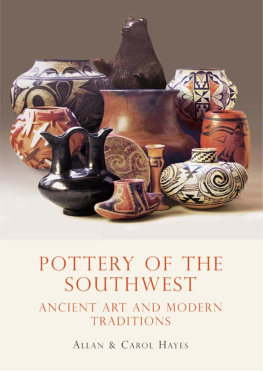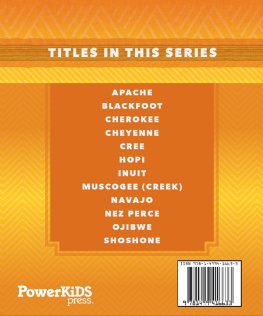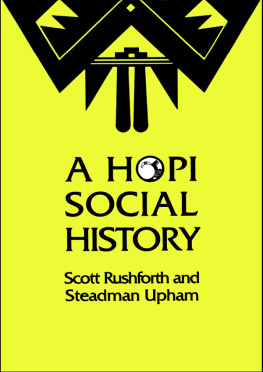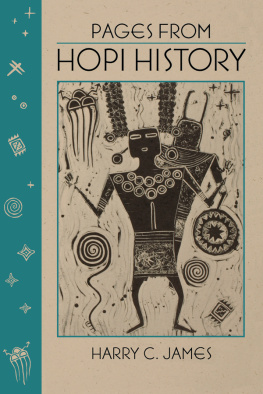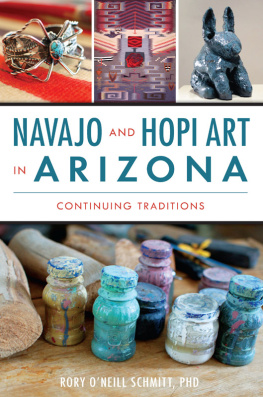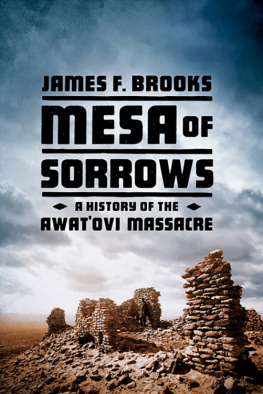Barakaldo Books 2020, all rights reserved. No part of this publication may be reproduced, stored in a retrieval system or transmitted by any means, electrical, mechanical or otherwise without the written permission of the copyright holder.
Publishers Note
Although in most cases we have retained the Authors original spelling and grammar to authentically reproduce the work of the Author and the original intent of such material, some additional notes and clarifications have been added for the modern readers benefit.
We have also made every effort to include all maps and illustrations of the original edition the limitations of formatting do not allow of including larger maps, we will upload as many of these maps as possible.
OLD ORAIBI
A STUDY OF THE HOPI INDIANS OF THIRD MESA
BY
MISCHA TITIEV
PREFACE
BY FAR the greater part of the data presented in this monograph was obtained in the course of two visits to the Hopi Indians of Oraibi, Arizona. Trip was made during the summer of 1932, as a member of the field party in ethnology which was led by Professor Leslie A. White, of the University of Michigan, and which was financed and sponsored by the Laboratory of Anthropology, Santa Fe, New Mexico. The second visit was of much greater duration, beginning on the first of August, 1933, and terminating at the end of March, 1934. The extended stay was made possible by a generous grant from the Division of Anthropology at Harvard University, and the Laboratory of Anthropology served as field headquarters. Since then I have twice revisited Oraibi, in the summers of 1937 and 1940, in order to freshen my contacts with Hopi culture.
The researches conducted by Professor White in 1932 fell into two divisions. While Dr. White, assisted principally by Kennard and Spirer, was investigating clans, lineages, and related phenomena, Eggan and the writer devoted themselves primarily to a study of the kinship system and the behavior of kindred toward each other. The material secured by all the members of the party was interchanged, and the results of the expeditions work are incorporated within the present volume. On my second visit I was permitted to live in the old pueblo of Oraibi on top of Third Mesa, and to participate to a considerable extent in the everyday life of the village. At this time I followed up the previous study of Hopi social organization, and undertook an intensive investigation of Hopi religion. In writing out my notes it has been impossible to segregate the material secured on the two field trips, so that it is to be understood that this monograph embodies a report of the work accomplished by the Laboratory of Anthropologys party in ethnology for 1932.
It is with a feeling of sincere appreciation that I wish to acknowledge my indebtedness to the entire staff of the Division of Anthropology at Harvard University during the years that I studied there. More particularly, I am grateful to Professors Tozzer and Hooton for their continued support of my project, and especially to the late Professor Roland B. Dixon, under whose guidance a good deal of my field work was done, and with whose help my material was first written out.
I am likewise indebted to the Laboratory of Anthropology and to its former director, Jesse L. Nusbaum, for the award of a scholarship in the summer of 1932, and for the additional help I received in the following two years.
To Professor Leslie A. White I owe thanks for a sound introduction to practical field work, and for many useful suggestions regarding my subsequent investigations. From my fellow students at Oraibi in 1932Fred Eggan, Ed Kennard and Jess SpirerI have received various aids from time to time, notably from Dr. Eggan, some of whose work has run parallel with my own, and who has always offered me his unstinted help and co-operation and has given me the benefit of a penetrating criticism of my manuscript.
While I was in the field, the late Dr. Elsie Clews Parsons {1} was editing the Hopi Journal of Alexander M. Stephen, an invaluable source-book for all students of the Hopi. Although it had not yet been released, Dr. Parsons very kindly supplied me with a full set of galley-proofs. These I used throughout my extended stay at Oraibi, and they proved to be of immeasurable help in my work. In addition, Dr. Parsons has put a number of other publications and articles at my disposal and has sent me a host of fruitful suggestions both for field investigation and with regard to the handling of data after they were gathered. Dr. Parsons has very graciously taken the trouble to criticize a typescript of a good part of my manuscript, and a large number of her comments have been included in the final text.
I should like to take this opportunity also to express my thanks to Professor Clyde Kluckhohn for his helpful advice in regard to the arrangement of my material; to Professor W. L. Warner, particularly for his aid in the analysis of the kinship data; to Mr. and Mrs. Fletcher Corrigan, whose pleasant home at Oraibi furnished a most welcome relaxation from anthropological pursuits; to Mr. Lorenzo Hubbell, for his never-failing courtesy whenever I visited his trading post; to Mrs. Charis Denison Crockett, who gave me the notes she had gathered at Oraibi in the summer of 1933; to Miss Donna K. Miles, Miss Helen Gleason and her staff at the Dictaphone Station at the University of Michigan, for having typed the entire manuscript; and to my wife for her help in the tedious work of checking references and making final revisions.
MISCHA TITIEV
January 6, 1941
LIST OF FIGURES
1Situation A
2Situation B
3House and street plan of Old Oraibi.
4Oraibis sacred stone
5Oraibi land holdings
6Sticks swallowed during the Momtcit performance
7The suns daily cycle
8The suns annual cycle
9The cycle of life and death
10Fields cultivated by two men
11Hotevilla kivas
12Final position of Niman Katcina Dance
13Yellow Qqqlom Katcina at Chimopovy
LIST OF PLATES
FRONTISPIECE.The Pueblo of Old Oraibi
I.The Pueblo of Hotevilla
II.a.A Mud Fight at Old Oraibi
b.Climax of the Mud Fight
c.Chief Tawaqwaptiwa of Oraibi
d.Frank Siemptiwa
e.The Masau Katcina
III.a.Soyal Pahos
b.The Shrine of Talautumsi
c.The Shrine of Sowika
IV.a.Archaeology in the making at Old
Oraibi
b.The Snake Shrine at Oraibi
c.The Shrine of Matcito
LIST OF CHARTS
I.A household group
II.The Hopi kinship system
III.Sex differences in kinship terminology
IV.Oraibi marriages (male)
V.Oraibi marriages (female)
VI.Clan and phratry divisions at Oraibi
VII.Clan and household distribution prior to 1906
VIII.Ceremonial affiliations of Oraibi Friendlies


